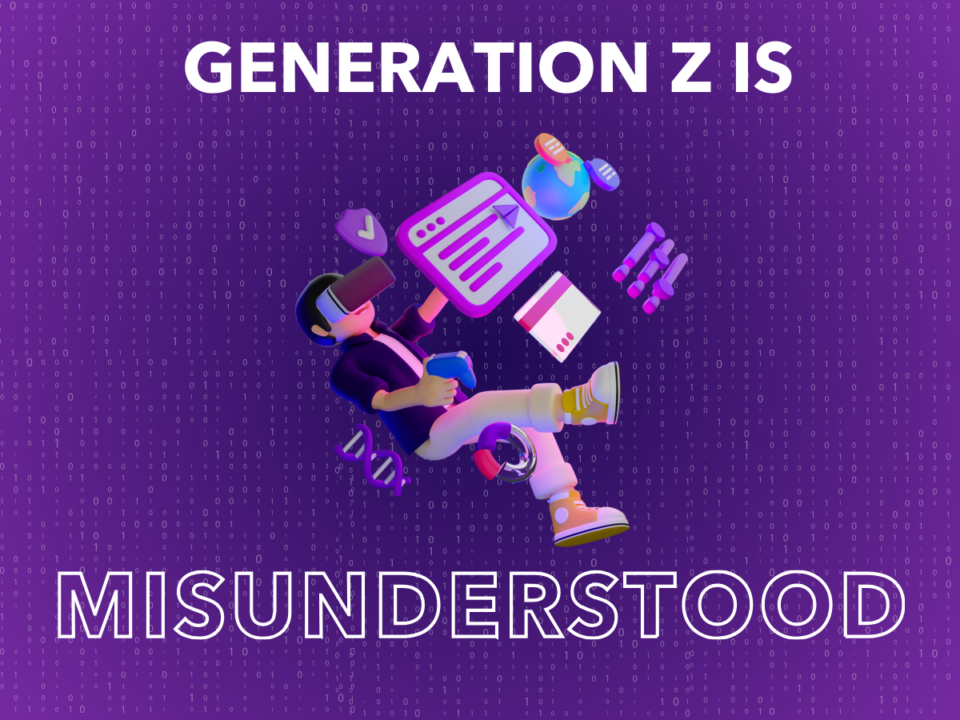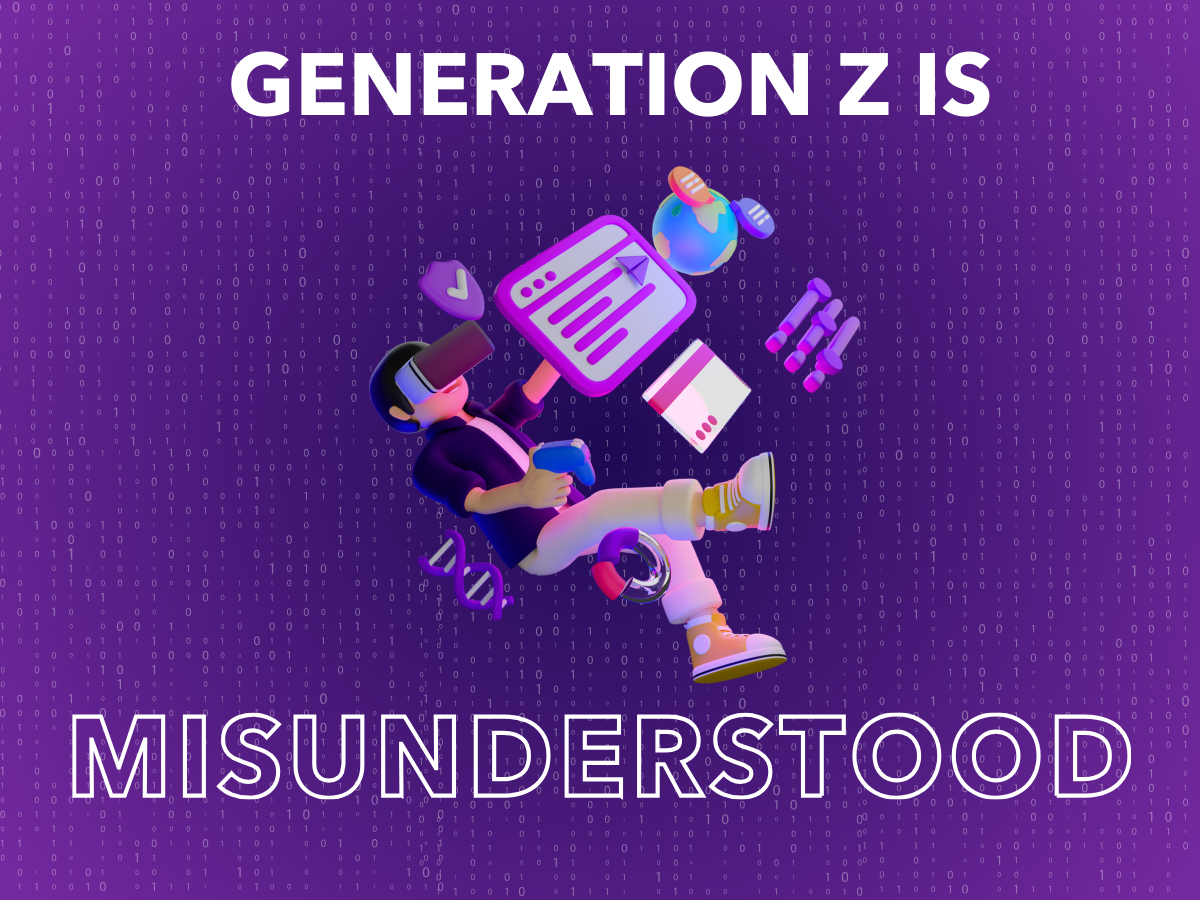
“Can you hear me now?”
Verizon has been asking us this for years, but many older generations feel like Generation Z isn’t hearing anyone because of their tech obsession and social disconnect.
Gen Z was born between 1997 and 2012 and is also referred to as Gen Tech, Digital Natives, iGeneration, Centennials, and Gen 9/11. According to the World Economic Forum, Gen Z accounts for 32% of the world’s population, making it the largest generation ever. By 2025, Gen Z will make up 27% of the workforce. It’s predicted that only half of us will obtain a University degree, and in our lifetime, we will work 17 jobs, have five careers and live in 15 different homes.
Now that Millennials have grown up, Gen Z has taken their place as the most criticized generation. A lot of what people believe about Gen Z, however, simply isn’t true. What research shows is true: Gen Z has been unfairly judged and given a bad rap for being too tech-obsessed, too sensitive and lacking in social skills.
Gen Z is the most diverse generation in US history. According to a report by the Pew Research Center, 48% of Gen Zers come from communities of color. Most of Gen Z will never remember a time before we had our first Black president or a time before same-sex was legalized. These are monumental moments that shaped who Gen Z is.
We saw our Gen X parents’ median net worth fall by 45% during the Great Recession and we watched the millennials take on massive amounts of debt and struggle to find jobs that pay well. Now, we’re planning our futures to avoid the mistakes other generations have made and seek degrees and jobs that offer security. According to The World Economic Forum, 88% of graduated Gen Zers end up choosing their majors with job availability in mind. These trends provide important context into why Gen Z receives so much unwarranted criticism.
Next, let’s talk about stereotypes often believed by older generations. There’s a lot of information out there about millennials, many calling them lazy and self-involved. Regarding Gen Z, most people assume we’re following in our predecessors’ footsteps. Some go as far as to say we’re “millennials on steroids.” One thing we get called often is tech-obsessed. I think we get this stereotype due to the fact that we’ve grown up with modern technology. And yes, we are definitely more connected to technology, but that doesn’t mean we’re obsessed.
Cloud communications firm 8×8 and Kiosk Research surveyed 1,000 employed Americans who use a computer or phone for work and found that Gen Z was less tech-addicted than millennials or Gen X, and is more concerned with effectiveness rather than efficiency.
Another name Gen Z has been given is “generation snowflake.” The word “snowflake” is commonly used to describe a person who is perceived to be too sensitive, easily offended and weak. The name “generation snowflake” was given to Gen Z by the baby boomers because they believed Gen Z was babied, protected from the real world and celebrated for minor achievements. Even if we regularly received awards for participating, this practice has been around for almost a hundred years.
What other reason could there be for our sensitivity? Hmm… maybe the internet?
The effect the internet has had on my generation is even more apparent in rural Minnesota, where I grew up. Most of the people in my hometown are white, and even more are over the age of 50. Looking at it from an outsider’s perspective, we’re pretty sheltered. That being said, most of my classmates were aware of debates surrounding topics like gun control and feminism. Many even had opinions that differed from their parents and grandparents. I believe this is because we’ve always had the world at our fingertips. We have the ability to connect to tens of thousands of people around the world at any given moment.
Gen Z has an advantage over other generations due to our familiarity with modern technology. We grew up being able to learn about the world and all the people in it without having to even leave our beds. Gen Z isn’t too sensitive. We’re culturally and socially aware.
How can we change these perceptions? We must explain the truth behind generational misconceptions and discuss our strengths.
Firstly, it’s hypocritical to accuse Gen Z of being addicted to their phones when you’d be hard-pressed to find anyone else who isn’t glued to theirs. According to a Nielsen Report, adults aged 35-49 generally spend more time on their phones and computers than younger generations. The same report explains that the average adult spends more time checking their email than their children check social media even on vacation!
Additionally, the innovations of modern society make it almost impossible to live without some sort of cell phone. Public payphones are nearly extinct and almost no one has a landline.
Secondly, Gen Z is much safer than the previous generations. According to Global News, we have lower rates of drinking, drug use, and teen pregnancy. As 19-year-old college student Demi Babalola explains in The Guardian, “We’re aware from an early age of how we’re portrayed online and offline, so we curate ourselves in a more conservative way.”
In other words, no one wants to make a fool of themselves and get publicly shamed for it.
Lastly, Gen Z is eager to invest in our future. According to the World Economic Forum, the average age for Gen Zers to start researching financial planning is 13. More teens between 16-18 are going straight into the workforce. As I mentioned previously, only half of us are expected to earn a university degree. The reason behind this is very interesting. If they know they are capable of learning things themselves, they’ll look it up online or find a YouTube video rather than spend money to learn the same information. It makes sense; why waste money on something you can teach yourself?
It is easy to criticize new generations, especially when you aren’t used to their technology. But there’s always been new technology. Before the Internet, color TV was said to give you cancer. Before that, radio was accused of “distracting children from reading” and “diminishing performance in school.” An 1883 article in the weekly medical journal The Sanitarian argued that schools “exhausted children’s brains and nervous systems with complex and multiple studies, and ruined their bodies by protracted imprisonment.”
Even literature was feared! Newspapers were feared to “socially isolate readers and detract from the spiritually uplifting group practice of getting news from the pulpit.” Before that, Socrates warned against writing; “this … will create forgetfulness in the learners’ souls because they will not use their memories.” Despite all this, the pattern of older generations criticizing new technological innovations continues. Older generations claim that society is abandoning the traditional media they grew up with, ignoring that when their technology was introduced, it was also deemed harmful.
Although it may not always seem like it, Gen Z isn’t half bad. Every single generation brings something to our history that’s both important and necessary. Frankly, the issues and challenges we face today are too big and too important for us not to focus on the strengths of our generations rather than our differences.
So, “Can you hear me now? Good!”
Gillian Farinella can be reached at gefarinella@stthomas.edu.



